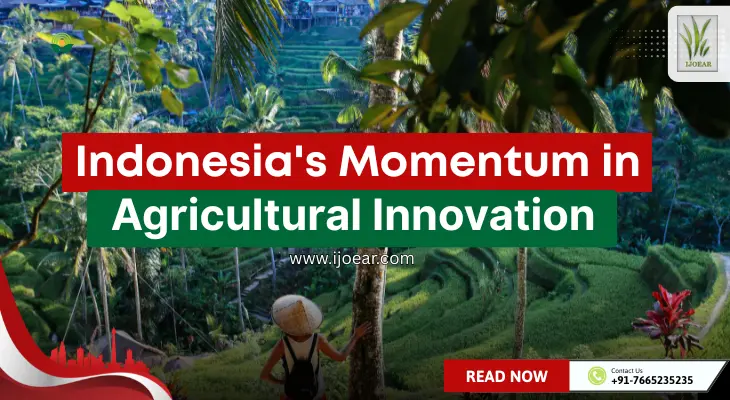
Agriculture has always been the backbone of Indonesia’s economy, culture, and food security. With more than half of its population directly or indirectly involved in farming, the sector continues to play a pivotal role in national growth. In recent years, however, Indonesia has entered a new phase—embracing innovation, sustainability, and digital transformation to strengthen its agricultural landscape. This momentum is positioning the country as a regional leader in modern, technology-driven farming.
Indonesia’s agricultural heritage is deeply rooted in its fertile soils, tropical climate, and diverse ecosystems. From rice paddies in Java to palm oil plantations in Sumatra, the nation has long relied on traditional farming practices. However, rapid population growth, urbanization, and global climate change have created new challenges that traditional methods alone cannot address. Issues such as land degradation, fluctuating yields, food security concerns, and environmental sustainability demand a more innovative approach.
Recognizing the need for reform, the Indonesian government has rolled out several initiatives aimed at transforming agriculture. Programs like the Food Estate Project and subsidies for digital farming tools are encouraging farmers to adopt modern practices. Moreover, partnerships with private companies and global organizations are providing resources, training, and funding to accelerate this transformation.
The government’s focus is not only on boosting productivity but also on ensuring that farming remains sustainable. By integrating technology with traditional methods, policymakers aim to create an ecosystem where farmers can thrive while safeguarding the environment.
One of the most significant drivers of Indonesia’s agricultural innovation is the rise of digital farming platforms. Mobile applications now connect farmers to marketplaces, provide real-time weather forecasts, and offer expert guidance on crop management. Startups and agritech companies are developing solutions such as drone-based monitoring, soil health sensors, and AI-driven pest management systems.
These smart farming tools are helping farmers optimize resource use, reduce waste, and increase yields. For example, precision irrigation systems are allowing efficient water usage, while data-driven insights are guiding planting decisions to maximize output.
Indonesia’s universities and research centers are playing a vital role in shaping agricultural innovation. Institutions like Bogor Agricultural University (IPB University) and the Indonesian Agency for Agricultural Research and Development (IAARD) are leading research in biotechnology, crop resilience, and sustainable farming systems. Collaborative projects with international universities and organizations are also enabling Indonesian researchers to explore cutting-edge technologies such as gene editing, biofertilizers, and climate-smart agriculture.
Climate change poses a serious threat to Indonesia’s agriculture, with rising temperatures, unpredictable rainfall, and increased risk of pests and diseases. In response, farmers and policymakers are focusing on climate-resilient practices such as:
By promoting sustainability, Indonesia is not only protecting its agricultural productivity but also contributing to global climate action.
The past few years have seen a surge in agritech startups in Indonesia, supported by venture capital funding and government incentives. Companies such as TaniHub and eFishery are revolutionizing supply chains, improving farmer incomes, and making agricultural markets more efficient. These startups are bridging the gap between smallholder farmers and consumers, ensuring fair pricing, transparency, and access to modern tools.
Despite the progress, Indonesia’s agricultural sector still faces hurdles:
Addressing these challenges requires stronger public-private partnerships, targeted training programs, and inclusive policies that ensure no farmer is left behind.
Indonesia is on a promising path toward becoming a leader in agricultural innovation in Southeast Asia. By combining policy support, technological advancements, sustainable practices, and active participation from startups and researchers, the nation is building a resilient and future-ready agricultural system.
The momentum in agricultural innovation is not just about boosting yields—it is about ensuring food security, improving farmer livelihoods, protecting the environment, and securing Indonesia’s place in the global agricultural economy.
Q1. What is Indonesia's flagship biofortified rice program?
Ans.: Indonesia developed Inpari IR Nutri Zinc (Zn rice) as part of its biofortification strategy. This program rapidly scaled up production in Banyuwangi, creating a premier model of biofortified rice enriched with iron and zinc. The initiative also integrates climate-resilient irrigation systems and eco-friendly technologies to improve nutrition and sustainability.
Q2. What is the role of AI in Indonesian agriculture?
Ans.: In 2025, the Indonesian Institute of Technology (ITS) formed an AI-driven consortium with leading universities and institutions. Their work focuses on precision farming, IoT integration, biomass energy utilization, and data-driven agri-insurance. Unlike earlier pilot projects, these technologies are now being deployed in real-world farming contexts.
Q3. Are new farm plants and biotech innovations progressing?
Ans.: Yes. In 2024, IPB University, in partnership with South Korea, launched a smart greenhouse and plant factory. This facility provides a platform for advanced research on sustainable and controlled-environment agriculture (CEA), enabling breakthroughs in crop breeding, resource efficiency, and biotechnology-driven farming systems.
Q4. What is being done about environmental concerns in agricultural expansion?
Ans.: To counter environmental risks, regeneration and agroforestry practices are being adopted in cocoa and palm oil programs. However, large-scale food estate projects in Papua and Kalimantan pose major challenges, including high CO₂ emissions, deforestation, and biodiversity loss. Policymakers and NGOs are calling for stricter environmental safeguards.
Q5. How is institutional capacity being developed?
Ans.: In 2025, Indonesia established the Agency for Agricultural Assemblies and Modernization, a central body uniting research efforts across crop innovation, mechanization, biotechnology, and extension services. Its aim is to modernize agriculture across the archipelago while ensuring smallholder farmers have access to new tools and training.
Q6. How are agritech startups contributing to agricultural innovation?
Ans.: Agritech companies such as TaniHub and eFishery are revolutionizing agriculture by connecting farmers directly to markets, providing digital advisory tools, and improving access to finance. These startups also play a role in scaling precision farming and aquaculture, making modern technology more accessible to smallholders.
Q7. What role do international collaborations play in Indonesia's agricultural progress?
Ans.: International partnerships with countries like South Korea, Japan, and the Netherlands are advancing research in biotechnology, greenhouse farming, and climate-smart practices. Global funding programs and academic exchanges are also helping Indonesian researchers and farmers access world-class innovations.
Explore these related articles to learn more about the global trends in agricultural technology and sustainability:
 NAAS Rating: 4.23
NAAS Rating: 4.23  December 2025 Issue
December 2025 Issue  Impact Factor: 6.69
Impact Factor: 6.69  Submit Article
Submit Article 
|
Citation Indices
|
All
|
Since 2020
|
|
Citation
|
6164
|
5117
|
|
h-index
|
31
|
29
|
|
i10-index
|
201
|
165
|
|
Acceptance Rate (By Year)
|
|
|
Year
|
Percentage
|
|
2024
|
11.09%
|
|
2023
|
15.23%
|
|
2022
|
12.81%
|
|
2021
|
10.45%
|
|
2020
|
9.6%
|
|
2019
|
14.3%
|
|
2018
|
17.65%
|
|
2017
|
16.9%
|
|
2016
|
22.9%
|
|
2015
|
26.1%
|